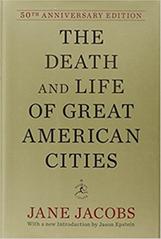 The Death and Life of Great American Cities by journalist and activist Jane Jacobs (1916-2006) is a savage critique of 1950s urban planning, the failures of urban renewal, and remains among the 20th-century's most influential urban studies books. With no academic credentials, Jacobs made lasting strides in the fields of economics and sociology. Her experience came first hand--as a resident of a Greenwich Village under threat by Robert Moses, whose plans for the Lower Manhattan Expressway would have destroyed Washington Square Park. In 1968, Jacobs was arrested at a public hearing during which the crowd rushed the stage and destroyed a stenographer's notes. She later moved to Toronto, where she remained for the rest of her life, over opposition to the Vietnam War.
The Death and Life of Great American Cities by journalist and activist Jane Jacobs (1916-2006) is a savage critique of 1950s urban planning, the failures of urban renewal, and remains among the 20th-century's most influential urban studies books. With no academic credentials, Jacobs made lasting strides in the fields of economics and sociology. Her experience came first hand--as a resident of a Greenwich Village under threat by Robert Moses, whose plans for the Lower Manhattan Expressway would have destroyed Washington Square Park. In 1968, Jacobs was arrested at a public hearing during which the crowd rushed the stage and destroyed a stenographer's notes. She later moved to Toronto, where she remained for the rest of her life, over opposition to the Vietnam War.
The Death and Life of Great American Cities (1961) criticized mainstream urban planning of the '50s and '60s, in which designers created unnaturally separated areas for residential, industrial and commercial use, a sort of decentralized city that was anathema to the original purpose of cities. She claimed that this anti-urban vein of urban planning was causing severe, if unintentional harm to American cities. Jacobs advocated mixed use development, small blocks with plentiful pedestrian permeability and retaining the unique character of neighborhoods, even at the cost of efficiency. In 2011, Modern Library published a 50th anniversary edition of The Death and Life of Great American Cities with a new introduction by Jason Epstein, the book's original editor ($23, 9780679644330). --Tobias Mutter

